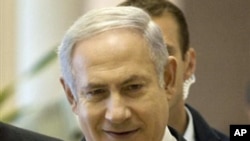Israeli media say Prime Minister Benjamin Netanyahu has told U.S. officials a credible military threat is needed against Iran to stop it from pursuing a nuclear weapons program. But, U.S. officials say Washington does not need a "credible military threat" to get Iran's attention, and U.N.-backed sanction against Iran are hurting Iran more deeply than anticipated.
Israeli Prime Minister Benjamin Netanyahu's remarks would represent an escalation of Israel's approach to what it perceives as the threat of a nuclear Iran.
The Israeli leader met Sunday with U.S. Vice President Joseph Biden in the U.S. city of New Orleans.
The remarks appeared in the Israeli media, quoting him as telling Biden that only a substantial military threat to Iran would make it unnecessary to exercise real military might.
Until now, Mr. Netanyahu has called for tough sanctions and diplomacy. His administration has mentioned military force only as a last resort.
Deputy Prime Minister Silvan Shalom clarified Mr. Netanyahu's remarks on Israeli radio.
He said Israel's approach must be a combination of two things. He said Israel must continue with sanctions, which he says it should toughen. Beyond that, Shalom says, the Iranians must understand that the bottom line is that the free world will stop them through military action."
Iranian President Mahmoud Ahmedinejad has repeatedly called for wiping the Jewish state off the map.
Meir Javedanfar, an Israeli commentator on Israeli-Iranian affairs, explains why the sense of urgency is growing among the Israeli leadership.
"The Israeli government seems to be very concerned about the fact that the Iranian government keeps coming up with new statements about how much progress it has made with the nuclear program and the fact that it has not come up with any new compromises to stop enrichment of uranium on its soil, and the Israeli government is worried the longer this continues, the closer the Iranian government will be toward its goal of making a bomb," said Javedanfar.
Israel's outgoing military intelligence chief last week said Iran has enough enriched uranium to make one nuclear warhead and will soon have enough for two.
If Israel decides to attack, it would not be the first time the Jewish state launches a pre-emptive attack on enemy nuclear facilities. In 1981, Israeli jets bombed a nuclear that Saddam Hussein was building in Iraq.
Some in Israel warn that such an action against Iran now would be a more difficult and risky undertaking for the Jewish state. Iran's facilities are believed to be spread across the country and some are underground. Critics warn the leadership against firing a first shot in what could be a drawn-out and complicated war.
U.S. Defense Secretary Robert Gates has rejected Mr. Netanyahu's call for a military threat against Iran. Speaking in Australia, Gates said he disagrees that only a credible military threat would convince Iran to take the actions it needs to end its nuclear-weapons program.















